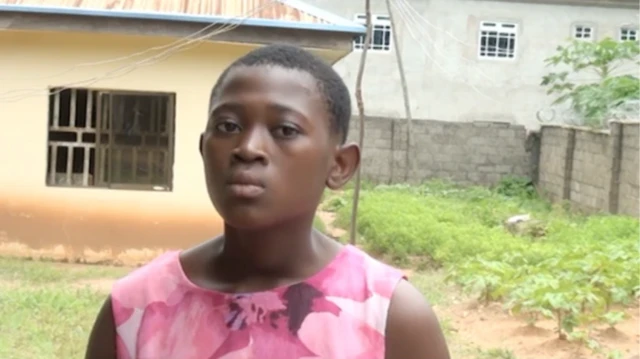Seven years have passed since the small coffin of Elizabeth Ochanya Ogbanje was lowered into mother earth. She was just 13, and her life, a bright dream of becoming a doctor, had been tragically cut short by complications linked to inhumane years of alleged horrific, devastating sexual abuse.
Yet, her name still echoes and reverberates across Nigeria’s social media and streets — a haunting symbol of resilience, systemic injustice, and a nation’s unfinished war against sexual violence.
This week, the hashtag #JusticeForOchanya roared back to life. Thousands of Nigerians — activists, lawmakers, and ordinary citizens — have re-ignited the heart-rending campaign that first shook the country in 2018, demanding accountability for the accused, whose acquittal continues to defy belief.
A Bright Dream Stolen Behind Closed Doors
Born in 2005 in Benue State’s Ogene-Amejo community, Ochanya was sent at age five to live with her aunt, Felicia Ogbuja, in Makurdi to continue her education after the local school closed. It was a move rooted in the promise of a better future. Instead, her life was allegedly stolen.
Reports revealed that for five devastating years, Ochanya was sexually assaulted, starting at age eight, by her aunt’s husband, Dr. Andrew Ogbuja, a lecturer at Benue State Polytechnic, and his son, Victor.
Even when their daughter, Winifred, discovered the abuse and reported it, neither Andrew nor Felicia informed Ochanya’s parents.
Dr. Ogbuja owed Ochanya a duty of care. He did not only fail to discharge the duty of care he owed Ochanya, he violated her fundamental human rights to life, to dignity of human person, all in the most despicable ways possible.
Of course, Ochanya’s mind would have been too young to understand the very concept of constitutional rights, but it is not impossible to imagine the pain, fear and helplessness she suffered before her death.
READ ALSO: #JusticeForOchanya Campaign Revives Seven Years After Teen’s Death
By 2012, Ochanya’s health had begun a terminal decline. The abuse caused severe medical complications, including Vesicovaginal Fistula (VVF), leaving her in constant pain and humiliation. Despite being a Junior Secondary School 1 student at the Federal Government Girls’ College, Gboko, she spent her final months in diapers, barely able to stand.
On October 18, 2018, she died at the General Hospital in Otukpo, triggering immediate and massive nationwide outrage.
Following her death, the initial push for justice saw Dr. Ogbuja charged with rape and child defilement, while Felicia Ogbuja faced charges of negligence under the Child Rights Act and the Trafficking in Persons (Prohibition) Enforcement and Administration Act, 2015.
The legal proceedings, however, turned into a painful lesson in judicial failure. In April 2022, two courts delivered conflicting judgments that exposed deep cracks in Nigeria’s legal process:
The Federal High Court found Felicia Ogbuja guilty of negligence and sentenced her to five months in prison, a sentence many activists deemed grossly inadequate given her statutory duty to protect the child.
The Benue State High Court, presided over by Justice Augustine Ityonyiman, acquitted Dr. Andrew Ogbuja of all charges.
The court’s rationale for the acquittal was stunning: “insufficient evidence” due to the failure of police investigators to conduct a medical examination to match Andrew’s DNA with evidence, and contradictory autopsy reports submitted as evidence.
Meanwhile, Victor, the son, who was accused alongside his father, never faced trial despite an outstanding arrest warrant, and is reportedly pursuing a music career in Lagos.
The verdict shattered hopes for a precedent-setting case. Instead, it reinforced what activists describe as a legal system that too often fails victims—especially children.
A Campaign Roars Back to Life
Late last week, the national frustration boiled over once more. Child rights advocate Betty Abah re-ignited the campaign, openly questioning the justice system that allowed Dr. Ogbuja to walk free. She urged the Benue State Government, the police, and the Federal Ministry of Justice to reopen the case.
Lawmakers have also joined the chorus, signaling a serious political push.
Senator Natasha Akpoti-Uduaghan (Kogi Central) vowed to bring the matter before the National Assembly, expressing her profound disappointment: “7 years ago the heart wrenching story of little Ochanya devastated me. I thought the perpetrators were in jail. Alas, they were discharged and acquitted. The family of late Ochanya Ogbanje should write a petition to me, Senator Natasha Akpoti -Uduaghan, Room 2:05 Senate Wing, National Assembly Complex , Abuja
“For our children, I stand for Justice for Ochanya,” she wrote on Instagram.
A Legacy That Demands Systemic Change
For many Nigerians, Ochanya’s painful story has become more than just a single case; it is a powerful mirror reflecting deep-seated issues surrounding gender-based violence and the sluggish pace of justice.
Her legacy connects to broader, crucial movements like #EndChildMarriage and #EndRapeInNigeria, becoming a rallying cry for a generation demanding that no child ever suffers in silence again.
“Justice for Ochanya” is no longer just a hashtag. It is a reminder that behind every trending topic lies a face, a family, and a nation still wrestling with the meaning of accountability.
Poor Ochanya. She must have dreamed of becoming a great person, must have considered several possible futures. And even if Ochanya did not ever enjoy daydreams of glory and joy, she still didn’t deserve to be subjected to such devious cruelty and pain. And as Nigeria remembers the little girl, the single, burning question remains: When will Ochanya finally get the justice she deserves?





